Blackpool schools prepare to welcome pupils back as parents asked to test them twice a week
and live on Freeview channel 276
With existing safety measures still in place alongside new plans for children to be tested twice a week, and with the resort’s infection rate continuing to fall, the town’s director of health says the reopening of schools is happening at the right time.
Dr Arif Rajpura who spoke of his worry about the impact learning from home has had on some, said getting them back in front of a teacher is “important”.
Advertisement
Hide AdAdvertisement
Hide Ad“I’m worried about the educational equalities that might be widening, so I think it’s really important to bear that in mind for the wellbeing of children,” he said.
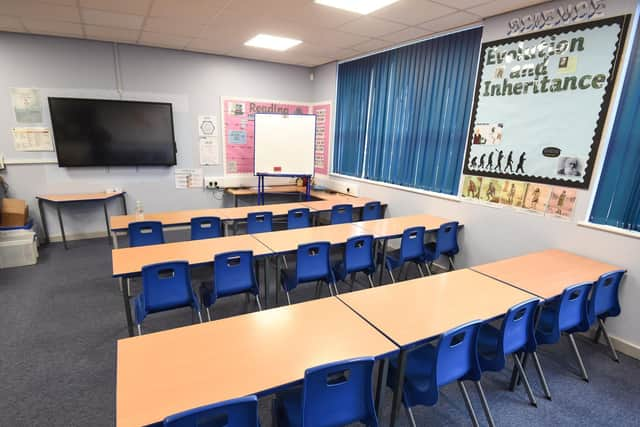

“I think it’s the right step that schools are opening.”
Whole families with children in school or college will be able to test themselves for coronavirus twice a week from home, with free rapid tests available to order online from the
Government’s website or to collect from local sites. Alongside masks – which are compulsory for secondary school children – and better ventilation, the tests mean it is possible to open schools “safely”, Calum Semple, professor of outbreak medicine and child safety at the University of Liverpool, said.
Prof Semple, who is also a member of the Scientific Advisory Group for Emergencies (Sage) said: “The good news is we’re finding quite low rates of active infection within the schools,” which have remained open for vulnerable youngsters and the children of key workers throughout term times during the pandemic.
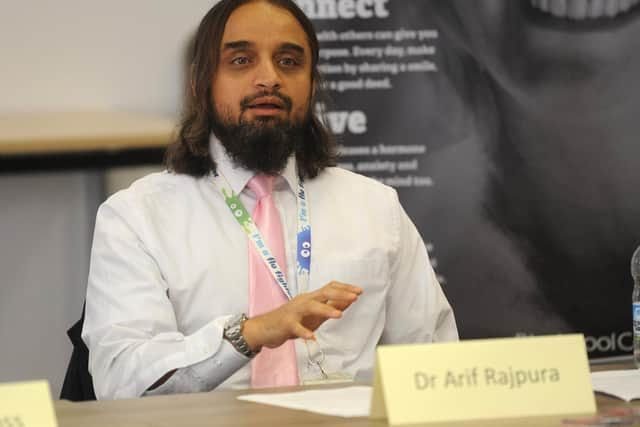

Advertisement
Hide AdAdvertisement
Hide Ad“We’re using the lateral flow antigen tests that identify those children that are most likely to be infectious – and about 1.2 per cent of school pupils are testing positive and about 1.6 per cent of staff are testing positive. Sometimes in some areas it’s down to 0.4 per cent.”
Dr Rajpura described the rapid tests as “another tool in the box” but said he doesn’t believe teachers and other school workers need to be given vaccination priority.
Two school workers – Michael Haigh, 60, a site supervisor at Christ the King, St Mary’s, and St Cuthbert’s, all in Blackpool; and Cath Strangwood, 57, a support assistant at Moor Park in Bispham – have died after contracting Covid, while positive cases have been recorded at more than a dozen local schools since September.
Dr Rajpura, who said it’s “reassuring” Blackpool’s community infection rate is lower than many other areas, said: “The strategy for the JCVI [Joint Committee on Vaccination and Immunisation] has been to try and reduce the number of deaths and to do it by age, so that’s why they’ve gone for the elderly people with underlying health conditions and that’s why it’s been rolled out that way. We’ve got an ambition in Blackpool to get everyone over the age of 50 done by the end of March. I thought it might take a bit longer, originally, to do this, but I think we’re in a position where we can be fairly confident.
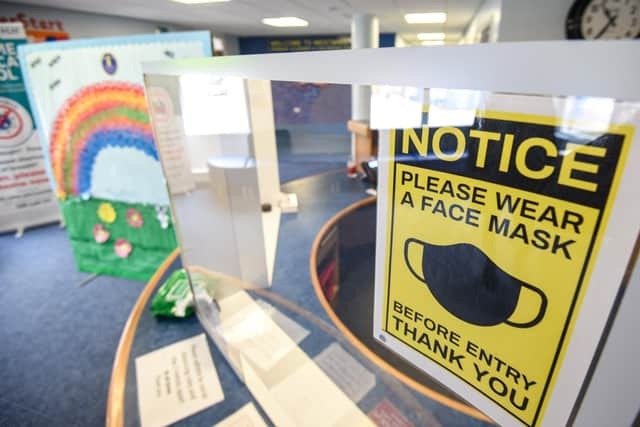

Advertisement
Hide AdAdvertisement
Hide Ad“I think once we’ve done that we can start to roll it out to the wider population and the JCVI made the decision that they want to do it by age as opposed to by occupation.
“It’s important to vaccinate the 45-year-old teacher as opposed to the 25-year-old teacher.”
Blackpool’s community infection rate was 80.3 per 100,000 people in the seven days to February 26 with 112 new cases, down from 129.8 per 100,000 with 181 fresh cases the week before, Public Health England data showed.
That’s below Corby, which has the highest rate of 229.9, but above the likes of West Devon at 7.2, with the resort ranked 153rd out of 315 local areas in England.
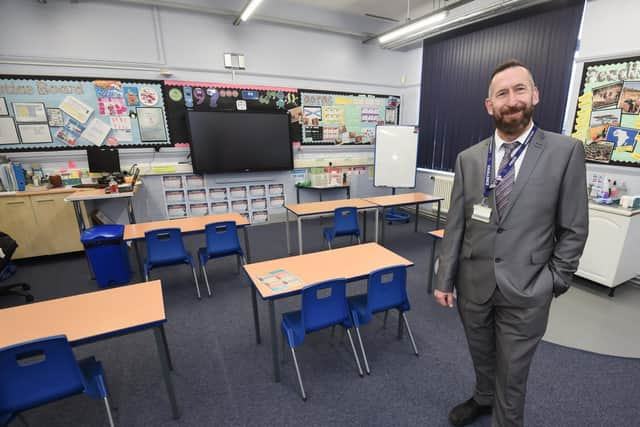

Advertisement
Hide AdAdvertisement
Hide AdAt the end of August, when pupils were last gearing up to return to school after a lengthy lockdown, and the summer break, the town’s infection rate was just 5.7 per 100,000 with eight cases recorded in seven days.
But in the seven days to January 3, shortly before Prime Minister Boris Johnson announced the latest lockdown and described schools as “vectors for transmission”, Blackpool’s infection rate was 291.2 per 100,000 with 406 confirmed diagnoses in a week.
Placing children into groups known as ‘bubbles’ has been a key safety measure at schools across the country in an effort to prevent widespread outbreaks, though Government guidance allows teachers to breach these, while children in different bubbles have reportedly mixed in before and after-school clubs.
Dr Rajpura said: “I think teachers are making every effort to stick to the bubbles and not cross into another. There have been very few instances where that has happened and we’ve had to then exclude wider than the class bubble. Most of the time we’ve been able to stick to the class bubble and ensure that it’s had a minimal impact on the school in terms of having to send children home.
Advertisement
Hide AdAdvertisement
Hide Ad“I’m hoping we will have to exclude less bubbles as we go into this next period because community Covid transmission is falling so that should hopefully help with the number of cases in children. Secondly we will have lateral flow testing so we’ll hopefully be rooting out some of the infections before they become symptomatic or before they spread within the classroom as well.”
Attendance rates throughout the latest lockdown have hovered at around 17 to 19 per cent, the council said, with “very low transmission rates”, though some schools began turning away key workers’ children due to a lack of capacity.
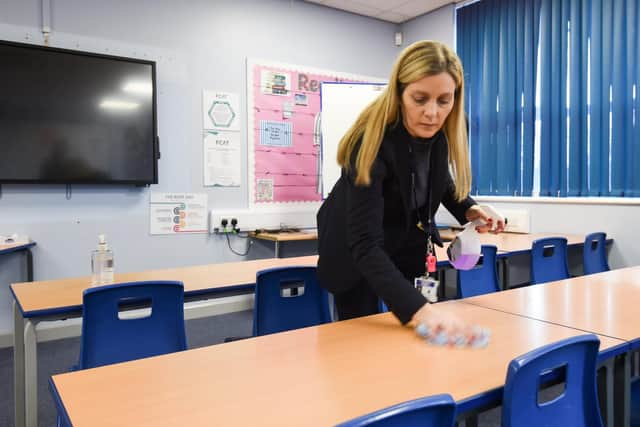

Dr Rajpura said he continues to meet with headteachers every week, working on protective measures and to give public health and infection control advice. And he issued some to parents too.
He urged them to test their children despite it being voluntary - and remind those of secondary school age they need to wear masks while in class. “Sometimes, obviously in the classroom, it may not be entirely possible but please do make every attempt to socially distance, particularly when people are outside of the classroom as well,” he added.
Advertisement
Hide AdAdvertisement
Hide AdRoger Farley is headteacher at Westminster Primary Academy in North Shore and both he and the teachers have been preparing again to reopen the school on Monday.
He hopes it will be the last time they need to reopen from a lockdown.
He said: “There is this perception that schools have caused a lot of the spreading because children and adults have to mix with each, so I think they’re going give it five weeks just to see what the impact on schools opening up will have.
“We’ve had to shut down two bubbles while we were open – year four and reception – and that can be around sixty children in each so that’s been a problem, and over the last year I have had about ten teachers actually have Covid so that also has a knock-on effect for the children because as soon as I have to shut a bubble they all have to go back to their families and then they come back and it then starts again – so it can be constant chaos.”
Advertisement
Hide AdAdvertisement
Hide AdRoger said the children can expect a week of being eased back into lessons and catching up with their classmates.
He said: “We’re doing deep cleaning as we move along and on Friday [today] there will be professionals coming in to clean as well. Between now and then, the teachers will be making sure the least amount of equipment that can possibly used will be used or things can be put away for 72 hours ready for it to be used on Monday.
“Teachers are also planning for the next week, both planning lessons but also for the mental health of children coming back.
“So we will be doing a lot of socialising to get them more familiar being in groups again. We do lots of work around playing together and actually working together as teams.
Advertisement
Hide AdAdvertisement
Hide Ad“For some of these children it’s been quite a few months since they have seen or been with other children so that will be a big part of it. Obviously we’ll do the maths and English because that’s important, but there will be less of a focus on that in the first week and more of a focus on socialising and the social and emotional aspects of getting back to school.”
Roger said only four cases of children with Covid have been reported in the school and he believes classes are safe for youngsters.
He said: “Much like the reopening in September, we’re secure as possible as we can be in school. We’ve got hand sanitisers and we encourage children to wash their hands.
“All the teachers are wearing masks around the surrounding corridors and we keep them in individual bubbles so that they are not crossing into other groups. The teachers have not stopped working and we have not closed down fully. We’ve had 20 to 30 per cent of the children in from vulnerable or key worker families so at the moment that’s around 160 children.
Advertisement
Hide AdAdvertisement
Hide Ad“The teachers are not only just teaching the classes, which are in smaller groups, but also they’re doing online learning as well so from the teachers’ point of view it’ll actually be better to get all the children back because you’re concentrating on the group that is in front of you. It’s a lot easier to do the teaching and the learning and feedback to the children if they are there, rather than trying to do it virtually.”
Blackpool Council said everyone has a “collective responsibility” to get everything right so the Government’s ‘road map’ out of lockdown is not jeopardised.
The authority said: “This isn’t just a problem for the schools to fix or for the public health team to. This is a worldwide pandemic and parents and the communities around school need to take some responsibility for that as well. That means wearing face masks when they’re going to schools and dropping the kids off and socially distancing in the queues outside and not hanging around for a natter, so there’s things that we all can do.
“There are things that the schools are doing and have been doing for nearly a year now, so we’re getting pretty good at this fortunately, but there’s also that challenge to the whole school community to protect their children, their families, and other school children by doing everything that they can possibly do as well.”
Advertisement
Hide AdAdvertisement
Hide AdThe union Unison described the move to open all schools at once as “completely reckless”.
Regional organiser James Rupa said: “We must not forget that Blackpool’s schools have been open throughout the pandemic, albeit with reduced pupil numbers.
“Our school support staff across Blackpool want to see all pupils back at school as soon as it is genuinely safe to do so, but the Government’s ‘big bang’ expansion of pupil numbers is a completely reckless and unnecessary risk to take.”
“After months of lockdown and with case numbers finally declining, there is no good reason to jeopardise this progress by bringing all pupils back at once.
Advertisement
Hide AdAdvertisement
Hide Ad“Blackpool’s schools and colleges need to be safe places for children, young people, staff, and parents and by hastily expanding pupil numbers, the Government has failed pupils, school workers and local communities in Blackpool.”
“This is why Unison continues to advocate for a phased return alongside the introduction of additional safety measures.
“If a ‘big bang’ reopening was always the Government’s prerogative, they could at least have protected school staff by prioritising them for the vaccine.”